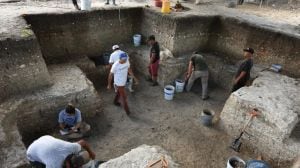Talks to take backseat, ultras to step in
Setting off earthquakes is what Israel’s Ariel Sharon has always done best. His final, dramatic disappearance from politics will be no ...

Setting off earthquakes is what Israel’s Ariel Sharon has always done best. His final, dramatic disappearance from politics will be no exception. It will shake Israel’s political landscape to its core and its deeper effect may be to destroy his hope of ending decades of conflict with the Palestinians—if only on his own uncompromising terms.
‘‘There is no one that can unite the country around the hard decisions that need to be made the way that Sharon could,’’ said Israeli political analyst Yossi Klein-Levi.
Doubt hung over whether Israel’s giant shift towards the political centre could survive even until March elections that he had looked certain to win.
Sharon’s new centrist party Kadima not only lacks any other leader with his record or ability to forge a new political force, it does not even have a list of election candidates.
Ehud Olmert, who has assumed Sharon’s prime ministerial powers, is a career politician who cannot command the same trust in Israel. Other potential successors, Justice Minister Tzipi Livni and Defence Minister Shaul Mofaz, lack solid political bases.
The disarray in Kadima will benefit what remains of Likud, the party now led by right-winger Benjamin Netanyahu after being shredded when Sharon jumped ship in a bid to escape rows with his own party over giving up occupied land.
Biggest winners from Sharon’s departure could be those at the extremes of both Israeli and Palestinian politics—Jewish ultra nationalist who do not want to give up any biblical ground and Islamists who want to destroy Israel.
Choosing a new leader will put on hold any peacemaking with the Palestinians under a long-stalled US-backed peace ‘road map’. Finding a replacement able to push through moves that would mean giving up at least some settlements in the occupied West Bank is a far greater challenge.
Despite Sharon’s turnabout from being godfather to the settler movement to the man who evicted settlements from Gaza, he was still no peacenik. His presumed plan, whether following the road map or not, would have been to remove some of the smaller isolated settlements scattered in the West Bank while keeping the largest—with the blessing of US President George W Bush.
Sharon’s apparent aims still fell far short of the state that Palestinians want on all the West Bank and Gaza Strip with East Jerusalem as a capital. They feared that Sharon, long reviled by Arabs for his role in all Israel’s wars since its creation, would dictate terms leaving them with just fragments of the territory they want.
The question is whether any other Israeli leader could deliver anything at all. — Reuters





- 01
- 02
- 03
- 04
- 05


























